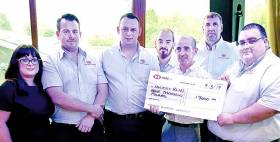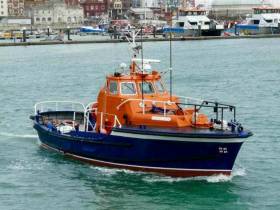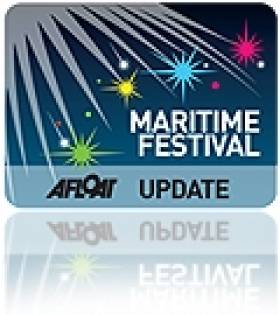Displaying items by tag: RNLI Lifeboats
The family of Ruth Maguire, who was drowned in Carlingford Lough last March, have raised £9,000 for Newcastle RNLI in her memory. Newcastle RNLI was involved in the search for Ruth along with other search and rescue agencies and recovered her from the lough after an extensive search. The lifeboat station was incredibly moved by the kind gesture from Ruth’s loved ones and have expressed their deep gratitude for the substantial donation.
Following the tragedy, Ruth’s family have carried out numerous fundraising events between Newcastle and Belfast. These included a sponsored walk of Slieve Donard and her brother-in-law completed the Belfast Marathon. A major fundraising night was also held in Byransford GAA club in Newcastle which was supported by people throughout the county.
Speaking during the handover of the cheque to Newcastle RNLI by members of the Maguire family including Ruth’s finance Jim, Newcastle Lifeboat Operations Manager Lisa Ramsden said, ‘We are completely overwhelmed by this donation. It was our sad duty to help bring Ruth home that day but the crew were honoured to be able to return her to her loved ones. Ruth was a local girl and we felt her loss, it was a difficult callout for the station and our hearts went out to her family and friends.’
‘We are astounded that in the weeks and months following her loss, that the family thought of others at this time and raised funds in her memory. It is a beautiful and fitting tribute to Ruth and we are extremely grateful for it. We will always remember Ruth and are proud that the funds raised in her memory will be spent here in Newcastle to help the work of the RNLI in saving lives.’
50 Year Old Former Dun Laoghaire RNLI Lifeboat Continues On New Career
#JohnFKennedy – A 50 year-old former Dun Laoghaire Harbour RNLI lifeboat which gave sterling service for more than two decades saving many lives, remains operating albeit in private ownership as a charter excursion boat, writes Jehan Ashmore.
The ‘Waveney’ class RNLB John F Kennedy built in 1966 at Lowestoft, was based at the Irish station until decommissioned in 1989. It was not until 1996 that the 44ft long Motor Lifeboat (MLB) was sold for the first time into private ownership on the Tyne, however her latest career is based on the English Channel.
Family run boat business, Bay Charters, according to Ships Monthly, have acquired the former lifeboat to run operations out of Sovereign Harbour, Eastbourne on the East Sussex coast. Named, Fortitude, the boat carries out charters for up to 12 passengers on fishing trips, diving to wreck sites and sightseeing excursions.
The Waveney class, Afloat adds are named after the River Waveney which flows into the North Sea at Great Yarmouth, however the origins are actually based from the design of the U.S. Coast Guard in which 110 were built.
The design drew considerable attention from overseas at the Ninth International Lifeboat Conference in Scotland in 1963. This led to the adoption of the class by the RNLI. Their first production-built Waveney class lifeboat was RNLB John F Kennedy, which was stationed at Dun Laoghaire from 1967.
In total, the RNLI had 22 such lifeboats in service in the UK and Ireland between 1964 until 1999.
The Waveney's were by the 1990's being superseded by faster boats, among them Dun Laoghaire’s current Trent class All Weather lifeboat (ALB) , RNLB Anna Livia, now in her 21st year of service. Also on station is a smaller D class inshore lifeboat craft (ILB) Realt Na Mara.
Many of the Waveney’s were sold for lifeboat services overseas notably in Australia and New Zealand. To read more on the RNLI, particularly the work of the Dun Laoghaire station, click here.
In 2015, the RNLI had the honour of bringing the first ‘Shannon’ class lifeboat home to Ireland. It was the first all-weather lifeboat class to be named in recognition of the contribution and bravery of the RNLI’s Irish volunteers, who have been saving lives in Ireland since 1826.
Last year the RNLI carried out 1,098 launches bringing 1,244 people to safety.
Heritage Week: Maritime Lecture Seminar Day
Below is listing of the lecture programme and times.
12.30 – 1.30 pm. Neutral Ireland's Role in the Sinking of the Bismark, May, 1941. By Dr. Michael Kennedy, Executive Editor, Documents on Irish Foreign Policy, Royal Irish Academy.
1.30 – 2.30 pm. Traditional Boats of Ireland. - Wooden workboats from all the Maritime Counties of Ireland. By Darina Tully, Lecturer and Maritime Archaeologist.
2.30 – 3.30 pm. Too Many Bags in the Lifeboat. A Lifeboat Tragedy at Bray 1876. By James Scannell, Lecturer and P.R.O of the Old Dublin Society.
3.30 – 4.00pm. Model Boats, A short talk to accompany the exhibition. By Garry Mooney secretary of the Irish Model Boat Club.
4.00 – 5.00 pm. Maritime Guinness, The Ships, Yachts and Barges of the Guinness Dynasty. By Dr. Edward Bourke, Diver, Maritime Historian and Author of "Guinness, the Family, the Business and the Black Stuff"
5.00 – 6.00 pm. Ireland's Armada Heritage. The Story of the Spanish Armada of 1588.The discoveries of the wrecks on the Irish Coast and the recovery of artifacts. By Cormac Lowth, Lecturer, Author and Diver.
For further information contact Barney Yourell Mob: 087 900 7466 No seminar charge – donations accepted
Information in general on the Maritime Institute of Ireland can be found on www.mariner.ie and for all the other events held during the National Heritage Week go to www.heritageweek.ie/
- Dublin Bay News
- Maritime Institute of Ireland
- Irish Model Boat Club
- Dun Laoghaire Club
- Dun Laoghaire Harbour
- M.I.I.
- Dun Laoghaire News
- RNLI Lifeboats
- National Heritage Week
- Heritage Week
- Maritime Lecture Seminar
- Sinking of the Bismark
- Traditional Wooden Irish Boats
- Guinness Ships
- Model Boats
- Ireland's Armada Heritage
- Spanish Armada
- Dun Laoghaire Maritime Museum
Sun, Sand and Sail at the Kilmore Quay Seafood Festival
The Kilmore Quay Seafood Festival starts this evening, now in its 42nd year, the four-day festival is surrounded by the culinary delights of locally caught fresh seafood, writes Jehan Ashmore.
In addition festival-goers can take part in the varied programme which caters for all age-groups. At 7.30pm tonight is the opening Grand Festival Parade featuring a 'Visitors From the Deep' float and Wexford's Community Samba Band 'Bloco de Fud Este'.
The festival will include a Seafood Platter Prize Competition, a children's creative art-workshop making 'Fish Kite-Windsocks', a Friday Fish Market with reduced prices and chefs cooking culinary dishes for sample-tastings and a Beach Band Barbecue.
On both the Saturday and Sunday there is the Tuskar Marine Modellors with their model boats and ships exhibition held in the Stella Maris Centre
and the Quay Times exhibition. Also throughout the weekend the Festival Arts Exhibition will be open in the RNLI Lifeboat House, noting Kilmore Quay is the first Irish lifeboat station to have the new Tamar-class lifeboat, the RNLB Killarney which can be viewed at its moorings.
On Saturday starting at 2.30pm is the "The Celtic Link Challenge" - Yacht Race when boats leave the marina at 3pm and return two hours later. The winners trophy will be presented in the Bird Rock Cafe at 6pm. If adverse weather conditions prevail the race will be re-scheduled for 2.30pm on the Sunday - weather permitting! For more information contact 086 2576862 and www.kilmorequayboatclub.com
To view the complete list of the festival programme, noting certain events and activities require an admission charge click HERE
- RNLI
- Tamarclass lifeboat
- Maritime Festivals
- Kilmore Quay Seafood Festival
- Kilmore Quay Marina
- Irish Seafood Festivals
- Stella Maris Centre
- RNLI Lifeboats
- RNLI Killarney
- Tuskar Marine Modellors
- Boat Models
- Seafood Platter
- Celtic Link ChallengeYacht Race
- Kilmore Quay Boat Club
- Fish Markets
- Beach Band Barbecue
- Celtic Link Ferries
































































